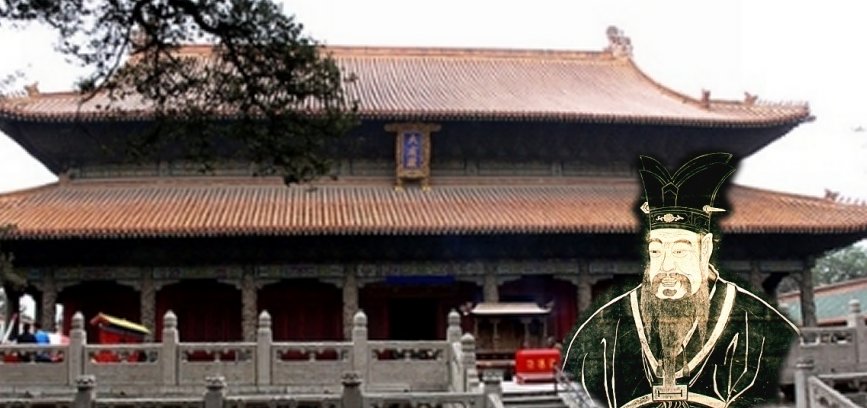Confucius: Philosopher, Educationist And Great Intellect With A Noble Morality
AncientPages.com - Today, it is time for another great man of ancient times and the most important figure in the Chinese history - Confucius. Better known as Master Kong or Kong Fuzi, in China, Confucius was a fifth-century BC philosopher and thinker, whose influence upon East Asian intellectual and social history is immense.
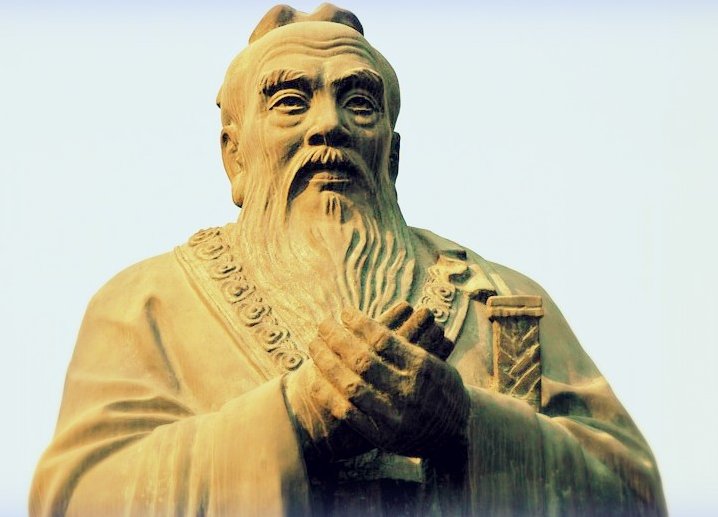
However, he was also a very controversial philosopher and teacher. Much of his approach to education and his ideas were strikingly experimental or in advance of those generally accepted.
He is considered the first great educationist, and his teachings taught in schools, had a great impact on both the past and present Chinese culture; their great power have survived until today.
In his hometown, Confucius established his own school – for both rich and poor students - in order to provide them with the teachings of the ancients. Confucius did not consider himself a ‘creator’ but rather a ‘transmitter’ of these ancient moral traditions. His school taught writing, rules of behavior and basic knowledge.
His teachings were later compiled and became known as Confucianism, which is not about a religion; it is about treating others with politeness, fairness and respect.
He was born in 551 BC in the State of Lu, (known today as Qufu in Shandong Province) in an impoverished aristocratic family. His father was a military officer and died when the son was 3 years old. Mother raised him alone. He knew poverty and endured a poverty-stricken and humiliating youth but despite a hard life, he dedicated himself to study at the age of 15.
In Chinese, his name was Kong Qiu; Kong was the family name while Qiu (meaning "hill") was his given name.
Confucius - an intellect with a noble morality - pursued truth, propriety, righteousness, wisdom, and trustworthiness, kindness and perfection throughout his life and his success and failure were largely due to his character. Some of Confucius’ famous words were:
“Everything has its beauty but not everyone sees it” and “Our greatest glory is not in never falling, but in getting up every time we do”.
Or: “Forget injuries, never forget kindness”.
According to ancient sources, his political career was not successful, but as a teacher and philosopher, Confucius was brilliant and full of achievements.
However, he was also a very controversial philosopher and teacher.
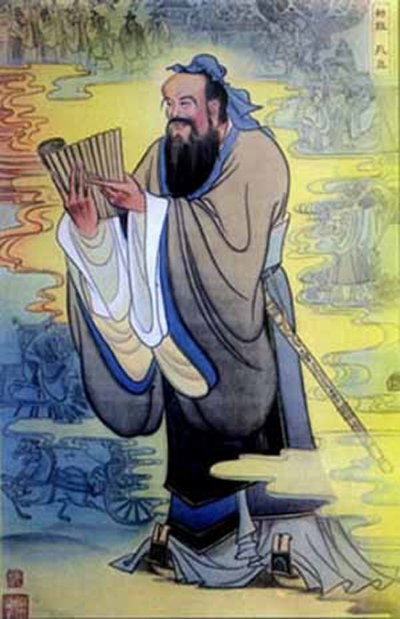 Much of his approach to education and his ideas were strikingly experimental or in advance of those generally accepted.
Much of his approach to education and his ideas were strikingly experimental or in advance of those generally accepted.
For example, he promoted the ideas "to educate all despite their social status" and "to teach according to the students' characteristics".
Especially, the first his idea broke with an old tradition as only the aristocracy had the privilege of education.
He also said, "Studying without thinking leads to confusion; thinking without studying leads to laziness."
Also as a political adviser, Confucius promoted several ‘unpopular’ reforms; he advocated low taxes, he demanded to entrust the leadership to "people noble and learned," regardless of their origin.
From 498 BC (when he was 53 years) many of his disciples began to cover the highest positions in government, Confucius still had a troublesome life and was often starving.
Probably, he did not gather many followers during his life; but there were many of them during the centuries following his death.
Legend has it that when he died, his students mourned him for three years, and the most faithful of them Tzu Kung – a businessman, an accomplished speaker, a good leader, who, probably led his own Confucian school at some point – visited the master’s grave in Qufu for six years saying: "since the beginning of mankind until now there wasn't a man equal to Confucius."
Confucius’ simple, undogmatic maxims are still popular. He argued that the moral sense in man is the equivalent of the cosmic order of nature. He never referred to the supernatural.
What make Confucius so special is that he did not claim that his doctrine comes from divine inspiration or other source inaccessible to ordinary people. Confucianism is not a religion, but rather a system of ethics, learning how to be a good, moderate, socially and ethically valuable man.
His statues became the subject of worship in schools, temples were built in his name and educated people often had (and probably have even today) a tablet of Confucius’ writings displayed in their houses.
The teachings of Confucius - ‘the king without a throne’ and his spirit are still alive.
Copyright © AncientPages.com All rights reserved. This material may not be published, broadcast, rewritten or redistributed in whole or part without the express written permission of AncientPages.com
More From Ancient Pages
-
 Tāne: Lord Of The Forest Who Brought Three Baskets Of Knowledge To People In Maori Mythology
Featured Stories | Feb 17, 2025
Tāne: Lord Of The Forest Who Brought Three Baskets Of Knowledge To People In Maori Mythology
Featured Stories | Feb 17, 2025 -
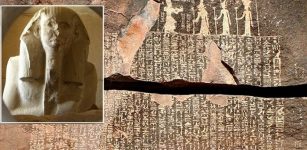 Djoser – Most Outstanding King Of The Third Dynasty In Ancient Egypt And His Step Pyramid
Featured Stories | Sep 7, 2021
Djoser – Most Outstanding King Of The Third Dynasty In Ancient Egypt And His Step Pyramid
Featured Stories | Sep 7, 2021 -
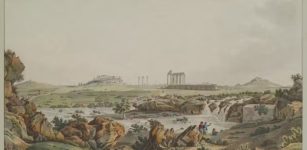 ‘The Waters Become Corrupt, The Air Infected’: Here’s How Ancient Greeks And Romans Grappled With Environmental Damage
Featured Stories | Nov 4, 2024
‘The Waters Become Corrupt, The Air Infected’: Here’s How Ancient Greeks And Romans Grappled With Environmental Damage
Featured Stories | Nov 4, 2024 -
 Fossil Bones From The Largest Penguin That Ever Lived Unearthed In New Zealand
Fossils | Feb 10, 2023
Fossil Bones From The Largest Penguin That Ever Lived Unearthed In New Zealand
Fossils | Feb 10, 2023 -
 Roman-era mass grave with 60 bodies found in farmer’s field
Civilizations | Aug 27, 2015
Roman-era mass grave with 60 bodies found in farmer’s field
Civilizations | Aug 27, 2015 -
 On This Day In History: Tokugawa Shogunate Begins In Japan After Historical Battle – On Oct 21, 1600
News | Oct 21, 2016
On This Day In History: Tokugawa Shogunate Begins In Japan After Historical Battle – On Oct 21, 1600
News | Oct 21, 2016 -
 9,000-Years-Old Underwater Artifacts Found Off The Western Australia Pilbara Coast – Protect Flying Foam Passage Scientists Say
Archaeology | Jun 27, 2023
9,000-Years-Old Underwater Artifacts Found Off The Western Australia Pilbara Coast – Protect Flying Foam Passage Scientists Say
Archaeology | Jun 27, 2023 -
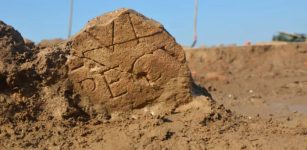 Surprising Discovery Of Almost Intact Roman Sanctuary With Temples In The Netherlands
Archaeology | Dec 23, 2022
Surprising Discovery Of Almost Intact Roman Sanctuary With Temples In The Netherlands
Archaeology | Dec 23, 2022 -
 Mysterious Mythical City Found In One Of North America’s Beautiful National Parks
Featured Stories | Feb 25, 2025
Mysterious Mythical City Found In One Of North America’s Beautiful National Parks
Featured Stories | Feb 25, 2025 -
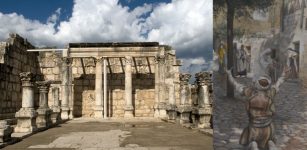 Capernaum – Was The City On The Sea Jesus’ Home?
Biblical Mysteries | Jan 25, 2019
Capernaum – Was The City On The Sea Jesus’ Home?
Biblical Mysteries | Jan 25, 2019 -
 Eye Of Horus – Powerful, Ancient Egyptian Symbol With Deep Meaning
Ancient Symbols | Jan 21, 2019
Eye Of Horus – Powerful, Ancient Egyptian Symbol With Deep Meaning
Ancient Symbols | Jan 21, 2019 -
 Ancient Bayanihan Tradition Of The Filipino People: Villagers Move Your Entire House Including Walls And Roof
Ancient Traditions And Customs | Sep 6, 2018
Ancient Bayanihan Tradition Of The Filipino People: Villagers Move Your Entire House Including Walls And Roof
Ancient Traditions And Customs | Sep 6, 2018 -
 Rare 1,000-Year-Old Viking Wooden Bowl Found By Young Boy
Archaeology | Oct 24, 2022
Rare 1,000-Year-Old Viking Wooden Bowl Found By Young Boy
Archaeology | Oct 24, 2022 -
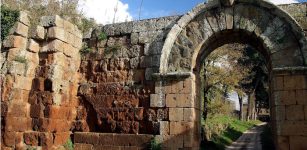 New Clues About The Fascinating Ancient Roman City Falerii Novi Revealed By Scientists
Archaeology | Sep 13, 2022
New Clues About The Fascinating Ancient Roman City Falerii Novi Revealed By Scientists
Archaeology | Sep 13, 2022 -
 Aboriginal Art And Knowledge Unlocks Mystery Of Fairy Circles
Archaeology | Apr 5, 2023
Aboriginal Art And Knowledge Unlocks Mystery Of Fairy Circles
Archaeology | Apr 5, 2023 -
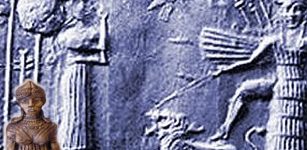 Ereshkigal – Ruler Of The Sumerian Underworld And Most Feared Deity In Mesopotamian Pantheon
Featured Stories | Mar 16, 2017
Ereshkigal – Ruler Of The Sumerian Underworld And Most Feared Deity In Mesopotamian Pantheon
Featured Stories | Mar 16, 2017 -
 Yuezhi Civilization: Ancient Nomadic People Who Once Ruled Bactria
Civilizations | Nov 29, 2018
Yuezhi Civilization: Ancient Nomadic People Who Once Ruled Bactria
Civilizations | Nov 29, 2018 -
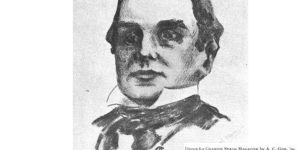 On This Day In History: Samuel Morey Patents The Internal Combustion Engine – On April 1, 1826
News | Apr 1, 2017
On This Day In History: Samuel Morey Patents The Internal Combustion Engine – On April 1, 1826
News | Apr 1, 2017 -
 Palatine Light Legend Is Based On A True And Tragic Event – What Really Happened On Block Island
Featured Stories | Dec 4, 2020
Palatine Light Legend Is Based On A True And Tragic Event – What Really Happened On Block Island
Featured Stories | Dec 4, 2020 -
 Ancient Unsolved Mysteries Of Siberia – A Place Full Of Secrets
Featured Stories | May 19, 2014
Ancient Unsolved Mysteries Of Siberia – A Place Full Of Secrets
Featured Stories | May 19, 2014

